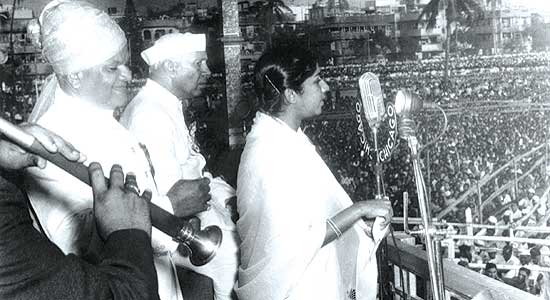Perhaps one of the most oft-quoted nationalistic songs, not from a Hindi film, but a creation of film industry bigwigs, has been Ai mere watan ke logon. Written by Pradeep and composed by C. Ramchandra, it was a homage to the Indian soldiers who died in the Sino-Indian War of 1962. Legend has it that Prime Minister Jawaharlal Nehru had tears in his eyes when Lata Mangeshkar sang it at Ramlila Maidan in New Delhi on Republic Day in ’63.
Some songs tug at the heartstrings and recall the values of nationhood in a more subtle, less overtly patriotic way. With its melancholic Sufi notes, Maula mere le le meri jaan, in Chak De India is a poignant conversation with the nation by a wronged citizen, a Muslim hockey player mistakenly supposed to have sold a win to Pakistan. He claims to have been loyal, devoted and integrated enough to be the third colour (teeja rang) of the tricolour. Then why, he asks, the accusation?
Lyricist Jaideep Sahni claims this song is his journey back to the ideals of the Indian Constitution and a lament for how far removed we are from them now. “My thoughts stem from the preamble which defines India as a secular, democratic, republic, assures equality, justice and liberty to its people and pledges to promote fraternity,” says Jaideep. “Why then do we keep questioning the minority community and its patriotism? Just because we have the strength of numbers? Such mobocracy is not what we signed up for 60 years ago,” he says.
It’s an uncomfortable thought to build a nationalistic song on. But like Jaideep, many lyricists, past and present, have tried to take the theme of nationalism beyond partisanship. Their songs are neither jingoistic nor chauvinistic; they try to deal with a more complex and profound idea of India. This is a nationalism that expresses itself by reflecting reality and critiquing and questioning political systems and social norms.
“We can’t sing false songs. Nobody buys the slogan Mera Bharat Mahaan because you know100 mein se 99 beimaan,” says lyricist-singer Swanand Kirkire whose Bande me tha dam inLage Raho Munnabhai called for a return to Gandhi as a cure-all. So we have songs of cynicism, dissent and even subversion, songs of the Great Indian Dream coming undone. But at the bottom of it, they too are an expression of love for the nation. “Any song which shows concern for society, which deals with the significant issues of the day, is patriotic,” says writer-poet Javed Akhtar. “Art that is built on dissent is an integral part of a mature democracy,” says Jaideep.
|
Read more HERE.


1 comments:
Excellent piece by Namrata Joshi. All my favorite songs are in her list. It is also heartening to see Gulaal and the lyricist Piyush Mishra get so much footage. The film was peppered with meaningful songs, that lamented the state of the country, the leadership, the political process.
Post a Comment